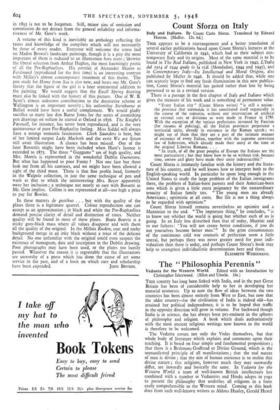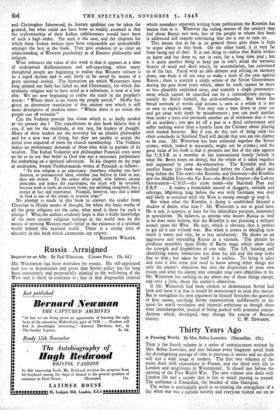The " Philosophia Perennis "
Vedanta for the Western World. Edited with an Introduction by THIS country has long been linked with India, and in the past Great Britain has been of considerable help to her in developing her
material resources. Up to now the flow of ideas between the two countries has been almost entirely from West to East, but now that the older country—for the civilisation of India is indeed old—has attained her political independence, it is to be hoped that traffic in the opposite direction will grow in volume. For backward though India is in science, she has always been pre-eminent in the spheres of philosophy and religion. A book which deals authoritatively with the most ancient religious writings now known to the world is therefore to be welcomed.
The Vedanta covers not only the Vedas themselves, but that whole body of literature which explains and comments upon their teaching. It is based on four simple and fundamental propositions; that there is a Brahman,. Godhead or Divine Ground, which is the unmanifested principle of all manifestations ; that the real nature of.man is divine; that the aim of human existence is to realise this divine nature ; that religions, however much they may outwardly differ, are inwardly and basically the same. In Vedanta for the Western World a team of well-known British intellectuals has combined with a number of Vedantists and Hindu adepts in yoga to present the philosophy- that underlies all religions in a form easily comprehensible to the Western mind. Coming as this book does from such well-known writers as AldOus Huxley, Gerald Heard and Christopher Isherwood, its literary qualities can be taken for granted, but what could not have been so readily assumed is that the craftsmanship of their Indian collaborators would have been of such a high order. Yet such is the case, and the chapters for which these Indian writers have been responsible are 'undoubtedly amongst the best in the book. They give evidence of as clear-an understanding of Western psychology as of Eastern philosophy and religion.
What enhances the value of this work is that it appears at a time of widespread disillusionment and self-searching, when many thoughtful people are beginning to realise that Western culture is in a rapid decline and is only likely to be saved by means of a great spiritual revival. The humanism on which Westerners have long pinned our faith has failed us, and Christianity, for which this synthetic religion was to have acted aa-a substitute, is-now at a low ebb. We are now beginning to realise the truth in the prophet's words: " Where there is no vision the peoPle perish." Moffat has given an alternative translation of this ancient text which is still More descriptive of modem times: "Where there is no vision the peoPle cast off restraint." Can the Vedanta provide that vision which is so badly needed at the present day ? The contributors to this book believe that it can, if not for the multitude, at any rate, for leaders of thought. Many of these leaders see the necessity for an idealist philosophy and for a new way of living, but they are unable to accept the initial tests required of them for chuich membership. The Vedanta makes no preliminary demands of those'who wish to partake of its wisdom. The Indian Vedantist and philosopher Pataniali even went so far as to say that belief in God was not a necessary preliminary for embarking on a spiritual adventure. In his chapter on the yoga of meditation, Swami Prabhavananda writes of Patanjali as follows: " To him religion is an experience: therefore, whether you haVe
theories, or preconceived ideas, whether you believe in God or not,
does- not matter. To the seeker after - truth, who follows certain
principles and makes the expetiment, the truth will be revealed, because truth is truth, an existent factor, not anything imaginary, but a matter of fact and experience. Patanjali, however, says that a belief in God is one of the means to practice yoga."
No attempt is made in this book to convert the reader from Christian, to Hindu modes of thought, for when the basic truths of all the great religions are the, same, what need is there for such a change ? What the authors evidently hope is that a wider knowledge of the most ancient religious writings in the world may be the means of reviving Western man's belief in the existence of a spiritual world behind this material world. There is a strong note of sincerity in this book which commands our respect. -
KENNETH WALKER.











































 Previous page
Previous page